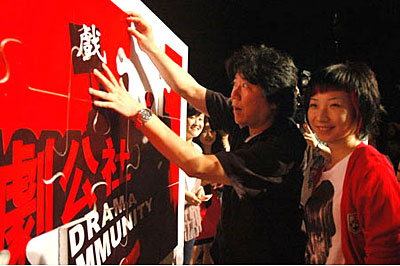|

The Drama Community, a club that aims to provide a platform for young drama lovers, was founded in Beijing on July 28, 2007. Co-organized by the Beijing Dramatists' Association, New Script Magazine, Oriental Pioneer Theatre of National Theatre Company of China and Yong Le Culture & Communication Co., Ltd, the Drama Community will offer professional guidance in acting, dialogue delivery, etc. Dramatists hope to solicit suggestions from experts and audience alike, to help polish the scripts and performances. The move is also seen as a litmus test of market success, to gauge how well the plays will be received. Most members of the Drama Community, according to the organizer, are enrolled university students in Beijing.
Preserving its youthful ways
In several ways Chinese theater is still young, even though 2007 marks the 100th anniversary of modern Chinese drama. The first half of the twentieth century saw a rising trend in Chinese arts and culture, despite the country suffering from the chaos of war and political turbulence. According to Ouyang Shanzun, a senior drama artist in China, modern Chinese drama was "struggling, nationalistic and realistic" given its special conditions at the time.
In 1934, the popularity of Chinese drama reached a new peak when Lei Yu (Thunderstorm) was published in Literature Quarterly Volume 1 No.3. The author, Cao Yu, who later became China's most renowned drama artist, was just a fourth year student in Tsinghua University at the time, and the play was his debut drama work. It's estimated that Thunderstorm is now the most performed play in China.
Since the establishment of the People's Republic of China in 1949, drama here has chalked up several achievements. Numerous art theaters and drama academies were founded nationwide in the 1950s and '60s. Unfortunately, the Cultural Revolution (1966-1976) brought a sudden end to this. There was no sadder scene than that of thespians driven out of their raison d'être and forced into mundane jobs as reception clerks and the like.
It was not until the implementation of reform and opening-up policy in 1979 that Chinese drama had a chance to be rehabilitated. Cha Guan (The Teahouse), performed by the Beijing People's Art Theatre, went overseas in fifteen countries and was honored as "a miracle from the Oriental stage"; drama festivals, big or small, were held nationwide. But this rosy scenario was not to last for long. Theatre was rapidly becoming eclipsed by the development of mass media, TV in particular.
At the beginning of the 1990s, the scene was rather bleak for Chinese drama. Yin Xiaodong, Head of the Drama Section of the Arts Department under Ministry of Culture, attributes this bleakness to the high prices of tickets and the absence of well-written scripts.

History, however, tends to repeat itself. The influence of young director Meng Jinghui on drama in the 1990s can be compared to that of young playwright Cao Yu in the '30s. Meng finished his master's degree in directing, from the Central Academy of Drama, and entered the China National Experimental Theatre in 1992. Several of Meng's dramas - Si Fan, I Love Someone, An Accidental Death of an Anarchist, etc.- were received warmly by the audience as well as the market thereafter. In 1999, Meng's career hit an all-time high when his drama Rhinoceros in Love crossed the 100-performances mark. Meng is now widely regarded as one of the great pioneers of Chinese drama, championing the cause of commercial theatre in China.
|
